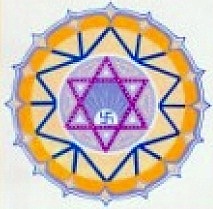Shivashaktyatmakam Brahma: Difference between revisions
(→Purport: ref name) |
m (Suggestions) |
||
| Line 1: | Line 1: | ||
{{Infobox Ananda Sutram | {{Infobox Ananda Sutram | ||
| image = Ananda Sutram symbol.jpg | | image = Ananda Sutram symbol.jpg | ||
| chapter = | | chapter = 1 | ||
| sutra_number = | | sutra_number = 1 | ||
}} | }} | ||
'''''Shivashaktyatmakam Brahma''''' is the first ''sutra'' of the first chapter of [[Prabhat Ranjan Sarkar]]'s ''[[Ananda Sutram]].<ref name="AS">{{Cite book|title=Ananda Sutram|last= | '''''Shivashaktyatmakam Brahma''''' is the first ''sutra'' of the first chapter of [[Prabhat Ranjan Sarkar|Shrii Shrii Anandamurti]]'s ''[[Ananda Sutram]].<ref name="AS">{{Cite book|title=Ananda Sutram|last=Anandamurti|first=Shrii Shrii|publisher=Ananda Marga Pracaraka Samgha}}</ref> | ||
== Translation == | |||
... add from book... | |||
== Purport == | == Purport == | ||
explaining the sutra's purport—<ref name="AS" /> | |||
<blockquote>Brahma (Cosmic Entity) is the composite of Shiva (Consciousness) and Shakti (Operative Principle).</blockquote> | <blockquote>Brahma (Cosmic Entity) is the composite of Shiva (Consciousness) and Shakti (Operative Principle).</blockquote> | ||
| Line 29: | Line 32: | ||
| title = [[Ananda Sutram]] | | title = [[Ananda Sutram]] | ||
| years = | | years = | ||
| with = | | with = Ananda Sutram</br>Chapter 1 | ||
| before = ''[[ ]]'' | | before = ''[[ ]]'' | ||
| after = ''[[ ]]'' | | after = ''[[ ]]'' | ||
Revision as of 14:30, 5 May 2014
 | |
| Ananda Sutram by Shrii Shrii Anandamurti | |
|---|---|
| Chapter | 1 |
| Sutra number | 1 |
| Location in Sarkarverse | |
Shivashaktyatmakam Brahma is the first sutra of the first chapter of Shrii Shrii Anandamurti's Ananda Sutram.[1]
Translation
... add from book...
Purport
explaining the sutra's purport—[1]
Brahma (Cosmic Entity) is the composite of Shiva (Consciousness) and Shakti (Operative Principle).
To explain this sutra, Prabhat Ranjan Sarkar told, although a piece of paper has two sides, for the sake of argument, they cannot be separated from the one paper entity. Removal of one side of the paper jeopardizes the existence of the other. Similar is the relation of Purusa (Consciousness) and Prakrti (Operative Principle) in the Cosmic Entity. They can not stand without each other. That is the reason it is considered that they are an inalienable concomitant.
Sarkar told, although as a philosophical word, shiva or puruśa is extensively used, in common parlance the word átmá (“soul” or “self”) is more extensively used in the same sense. The word "Shiva: means "witnessing consciousness". The word "Purusha" means the same thing—
Sarkar explained the word atma as "that which is omni-telepathic".
Then Sarkar told, the physical sense of the body is telepathised on the mental plate. It may be described as the physical sense is awakened in the mental plate due to the reflection that follows the impact of the crude physical waves on the mental plate. Similarly, the sense of every crude object is awakened in the mental plate as soon as the reflection takes place following the impact of the waves of the objects on the mental plate. Identical mental waves hit the soul entity, causing the reflection of those mental waves, and this awakens in the unit a sense of its indivisibility from the soul. If, in the language of philosophy, mental waves, that is, thought, be called thought-waves, then the reflection of the mental waves on the soul-plate will have to be termed telepathic waves. And so in reference to the soul-plate, we may say that it is telepathic to the mind. All mundane objects, crude, subtle or causal, consist in mental waves or thought-waves, and so in the fullest accord with reasoning and logic, we may call the Soul omni-telepathic. It is because of this omni-telepathic Átman that the existences of all mundane objects, visible or invisible, large or small, find their factual substantiation and recognition.
He concluded—
Had there been no Átman, the existence of everything would have been in jeopardy.
References
| Preceded by [[ ]] |
Ananda Sutram With: Ananda Sutram Chapter 1 |
Succeeded by [[ ]] |
